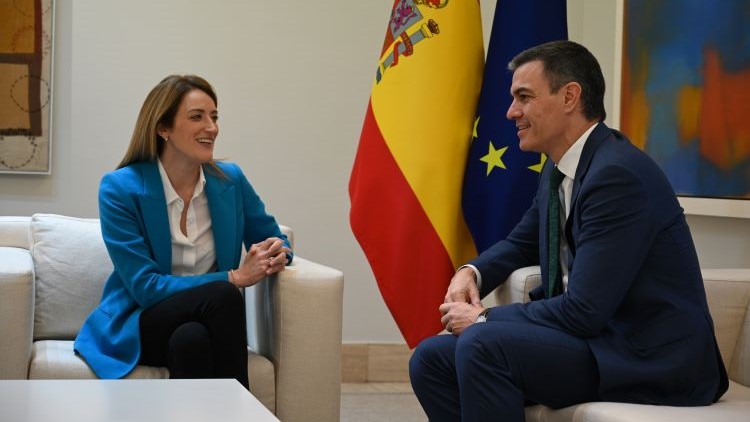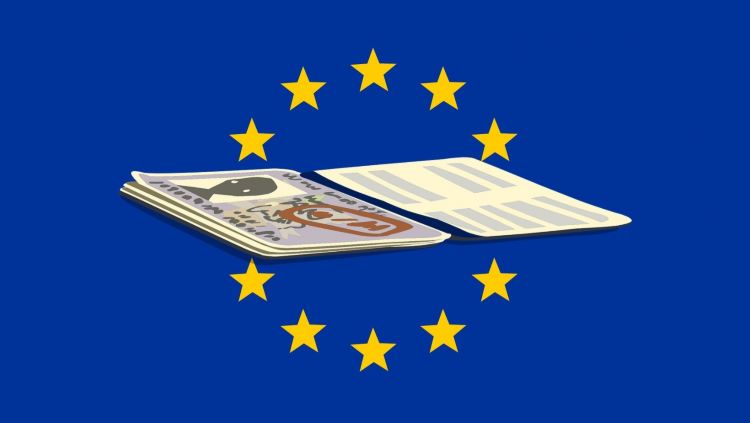Eduardo González
The president of the European Parliament, Roberta Metsola, was received yesterday in Madrid by the president of the Government, Pedro Sánchez, and by the Minister of Foreign Affairs, José Manuel Albares, who defended the use of the Spanish co-official languages in the plenary session of the European Parliament. Likewise, Metsola warned during an event that “Russia’s aggression represents an existential threat also for the European Union.”
Metsola was received by Pedro Sánchez at the La Moncloa Complex, within the framework of her tour of the 27 EU member states to promote participation in the European elections, which will be held between June 6 and 9. During the meeting, as reported by Moncloa, both agreed “on the importance of promoting participation in the next elections, in which more than 370 million citizens are called to the polls, at a time when Europe faces great challenges.”
She then met with the leader of the PP, Alberto Núñez Feijóo, the president of the Senate, Pedro Rollán, and with Minister José Manuel Albares. In this second meeting, according to Foreign Affairs, Albares recalled the importance that Spain attaches to multilingualism and the use of co-official languages in the European institutions and reiterated to Metsola the Spanish request to be able to use the co-official languages in the plenary sessions of the European Parliament, the only main community institution with which Spain does not yet have an administrative agreement for the use of these languages.
Likewise, both agreed that the upcoming elections to the European Parliament are key to democracy and their concern about the low participation that these elections usually register, “although Spanish participation is above the EU average,” according to the Ministry, which recalled that in the last elections in 2019, participation in Spain was 60.7%. The meeting also served to review the Spanish Presidency of the EU and to address other current issues, such as the situation of farmers and ranchers in the EU, the negative impact of the COVID-19 crisis and the Russian war of aggression against Ukraine.
Russia, the Middle East and elections
The war in Ukraine was, precisely, one of the main topics of Roberta Metsola’s intervention at the inauguration of the International Forum of El Mundo, coinciding with the newspaper’s 35th anniversary. “We cannot take democracy for granted nor can we take for granted the freedoms that Europe offers,” warned the president of the European Parliament. “Too many in Europe remember what it means to live without freedom, and as Russia’s illegal and expansionist aggression enters its third year of war in Ukraine, of war against our values and our way of life, we must remember what is at stake. for Ukraine and for Europe and we have to remind our people that the freedoms we value did not arise by chance,” she said.
“I am proud that Europe has come together with unprecedented unity in support of Ukraine from the beginning,” Metsola continued. “We will continue, as long as necessary, because Russia’s aggression represents an existential threat also to our Union, to our values and to our freedom” and because “if we do not support Ukraine, everything we promised and everything we inherited “it runs the risk of falling apart,” she warned. “Europe will always defend peace, but we know that peace without dignity, without accountability, without justice, is not true peace at all,” she added.
“This is the same philosophy that drives our reaction to the situation in the Middle East, from the horrors of October 7 to the humanitarian catastrophe in Gaza,” said Metsola. “That is why we have pressed for a ceasefire, for the hostages to be returned and for Hamas to stop acting with impunity,” because “it is the only way to get more aid to Gaza, to save more lives and, above all, because “it is at the basis of a two-state solution that gives perspective to the Palestinian people, security to Israel and allows Gaza to be run by legitimate Palestinian authorities,” she said.
During her speech, Metsola warned “new voters” not to be “tempted by a cynical black and white narrative, when reality is always a thousand shades of grey”, and not to take “for granted the rights that Europe protects and the opportunities that our Union offers”, because “we have fought for them”. “We cannot allow that generation to regress to populist political extremes,” she asserted. “I think that is the biggest challenge we face in the next hundred days before the European Parliament elections on June 9,” said Metsola.
“That’s why I came here today; as President of the European Parliament, together with the Spanish MEPs, we have set out to break the Brussels bubble and bring Europe closer to the citizens it represents,” she assured. “We are here to listen to Spaniards, particularly young people, to persuade them not to take democracy for granted and invite them to join us in directing our future. Let them vote, because otherwise someone else will decide for them and they may not like that decision,” she concluded.
In response to a question from the director of El Mundo, Joaquín Manso, about the interference of Vladimir Putin’s Russian Government in several European countries, including Spain during the Catalan independence process, Metsola assured that “it is something that is really already being investigated.” At the beginning of February, the European Parliament itself approved a resolution denouncing the interference of the Russian security services in the independence process in Catalonia, calling for an investigation into the links between several MEPs – including the former president of the Generalitat Carles Puigdemont – and the Putin Government and Spain is asked to intensify and accelerate its investigations into Russia’s role in Catalan secessionism.
On Thursday, Metsola had a meeting with more than 300 young people at the Círculo de Bellas Artes in Madrid, in which she answered all the doubts and questions of young Spaniards with the purpose of encouraging their vote ahead of the polls and where she supported the granting of the right to vote from the age of 16, since, in her opinion, at that age one already has the necessary knowledge and criteria to exercise it.







